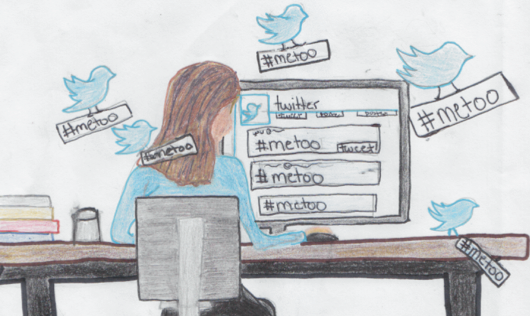Is #MeToo the right outlet to combat rape culture?

November 21, 2017
Power in numbers.
The “#MeToo” social media campaign has provided valuable support to survivors of sexual assault nationwide.
The hashtag began after allegations of assault against Hollywood producer, Harvey Weinstein. After being launched on Twitter, the movement immediately spread. According to CBS News, on Face- book, more than 4.7 million users posted upwards of 12 million posts, comments and reactions in less than 24 hours.
Those who had faced sexual assault were encouraged to come forward and share their story, or just simply write “Me too.” The magnitude of the problem was a shock to many men who do not experience the constant fear that comes with living in a patriarchy.
According to Wendy Dickson, Director of Domestic Violence Training and Prevention at the YMCA, the use of social media as a platform for contribution has given people everywhere the opportunity to have a voice and say things that they did not feel free to say before the campaign exploded.
The movement provides an accountability measure for men. The demonstrated omnipresence of assault has put the onus on men to collectively examine and amend behavior that feeds into the culture that the hashtag is critiquing. Men have responded by creating their own hashtags such as “#HowIWillChange” and “#Do-Better”.
Some causes are important enough that people feel the need to speak up. Such was the case with Black Lives Matter and “#DefendDACA,” which were created by people who are structurally oppressed by the government and felt the need to stand up.
“#MeToo” is an imperative first step towards generating enough momentum to spur reform. Since the campaign’s conception, several Hollywood stars have faced the repercussions of being outed as perpetrators of assault, showing an important cultural shift from victim-blaming to criminalization. Spreading awareness through social media taps into the most political segment of the population, young adults. This combined with connections to local resources and networks for survivors is the way to affect change.
The #MeToo movement may have good intentions, but it also has some problematic implications.
There has been a flood of people on social media coming forward with their stories of sexual harassment and assault. That has included a re-discovery of the #MeToo movement.
The purpose is to try and show how many people’s lives, have been affected by sexual harassment and assault. But, in doing so, the movement subconsciously creates some harmful implications. Mostly in that it puts pres- sure on victims, once again, to take responsibility for the actions of their attackers.
Once again, with #MeToo, survivors are forced to shoulder the responsibility of sexual assault. There is a reinforcement of a cycle which requires a marginalized group to take on the job of educating an oppressive one. If the #MeToo movement sounds familiar, it’s because it is. #YesAllWomen was a hashtag that gained momentum a couple of years ago, in response to a #NotAllMen hashtag that was going around. Both were a way to “show the world” the scope of sexual assault. They just aren’t willing to take the extra step to prevent it in the future.
According to Huffington Post, 1 in 3 women have been sexually harassed. New York Times reports 1 in 5 women have been sexually assaulted. It’s time for groups who either benefit or are complicit in sexual violence to speak up.
That means instead of making a #MeToo movement, that will be shared all over the world, there should be a hashtag that is along the lines of preventing sexual assault. Particularly around men. This means confronting friends, speaking up against “locker room talk”.
#MeToo started out with a very clear purpose, but the process which it takes to get there is problematic and repetitive of past actions. We should be having a conversation about people who actually commit sexual assault, not who are victims. We need to move forward as a society, and it is time that instead of questioning and outing survivors we confront perpetrators of rape culture.









